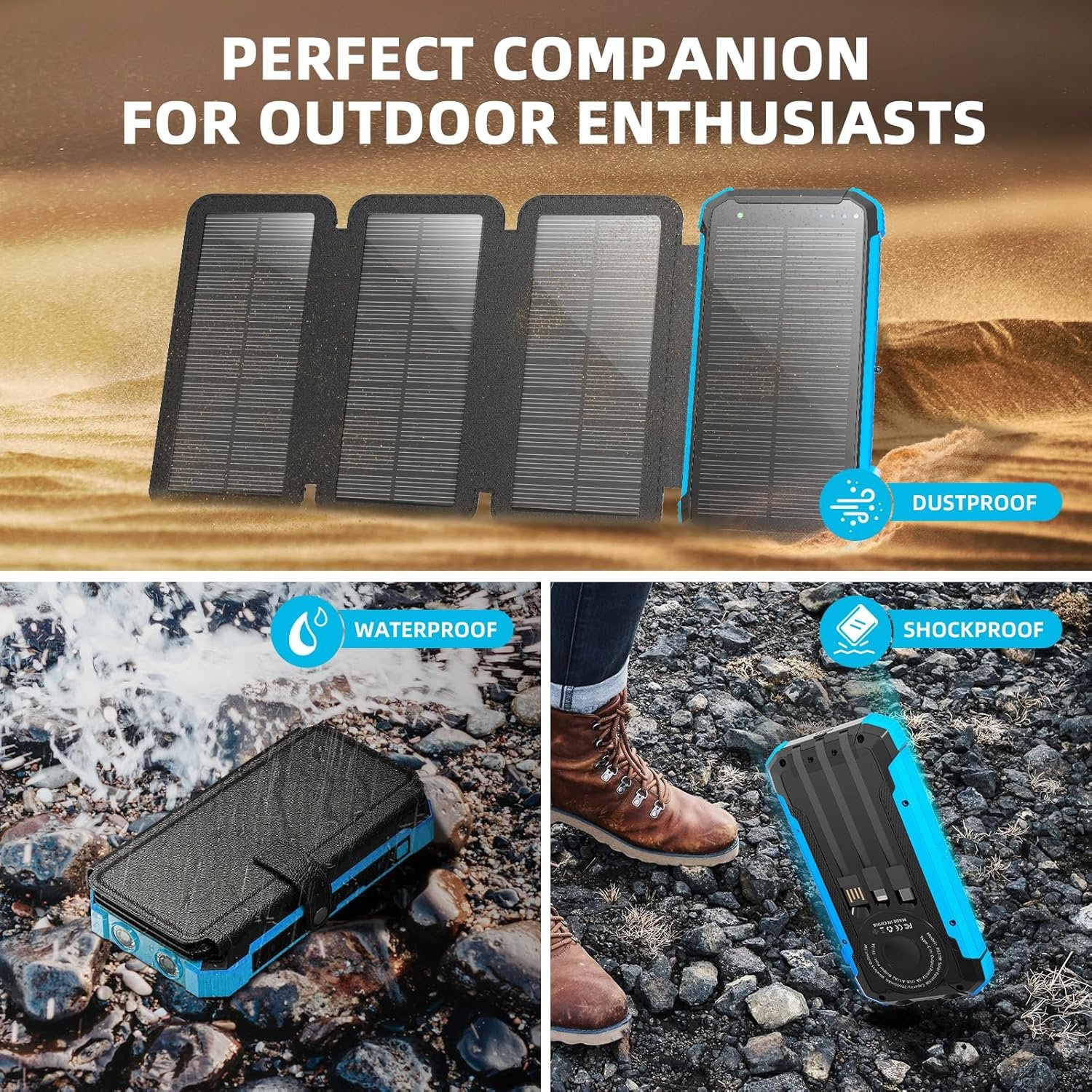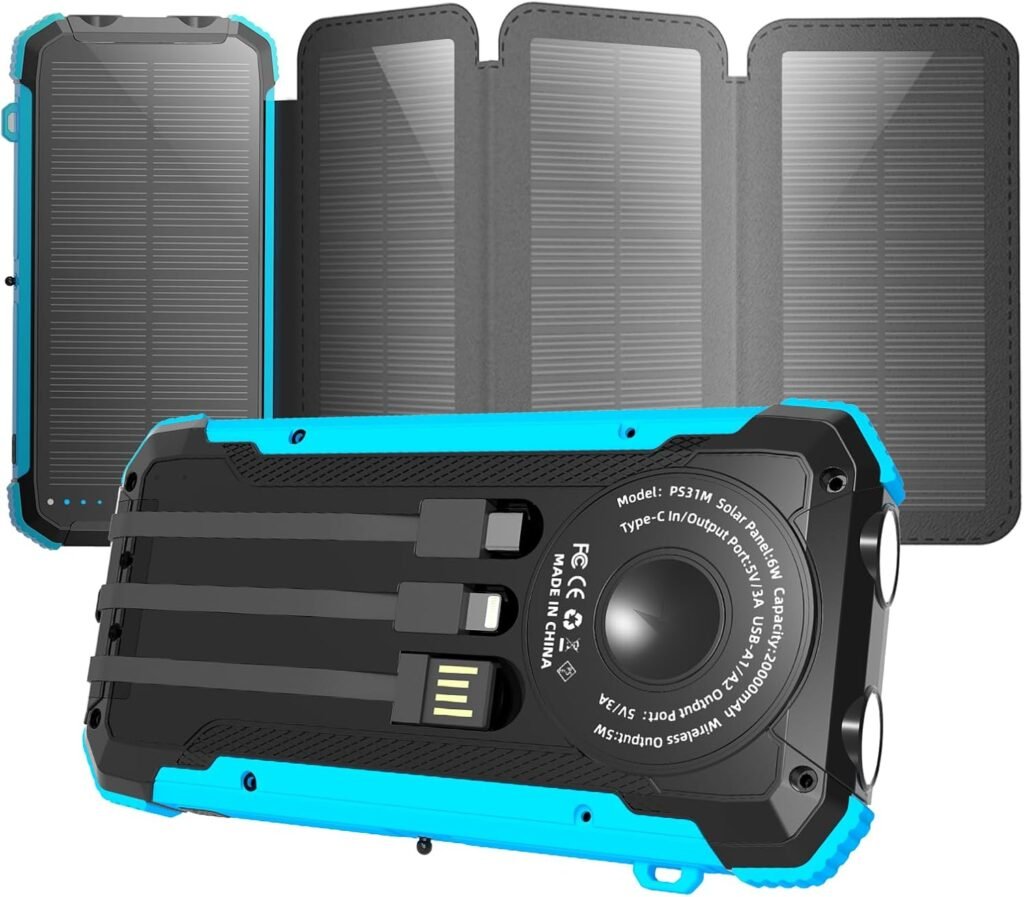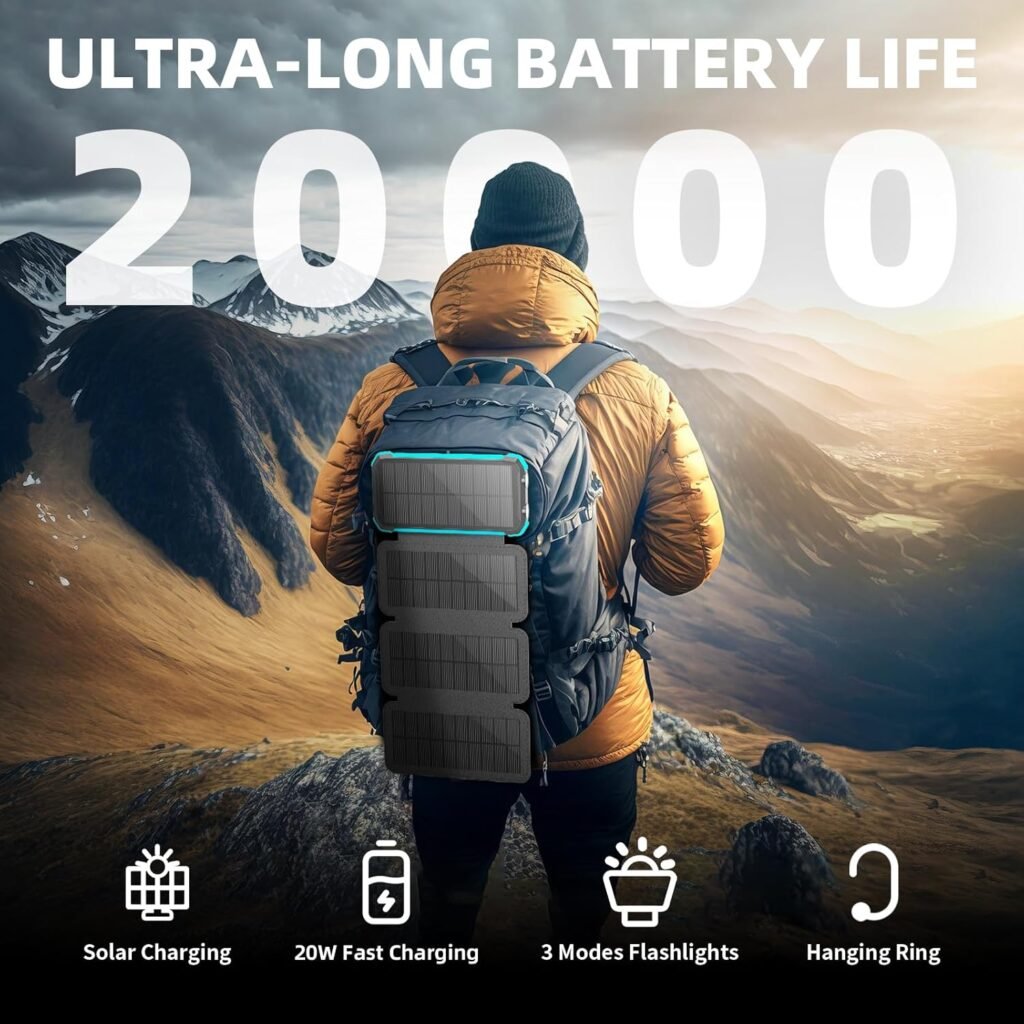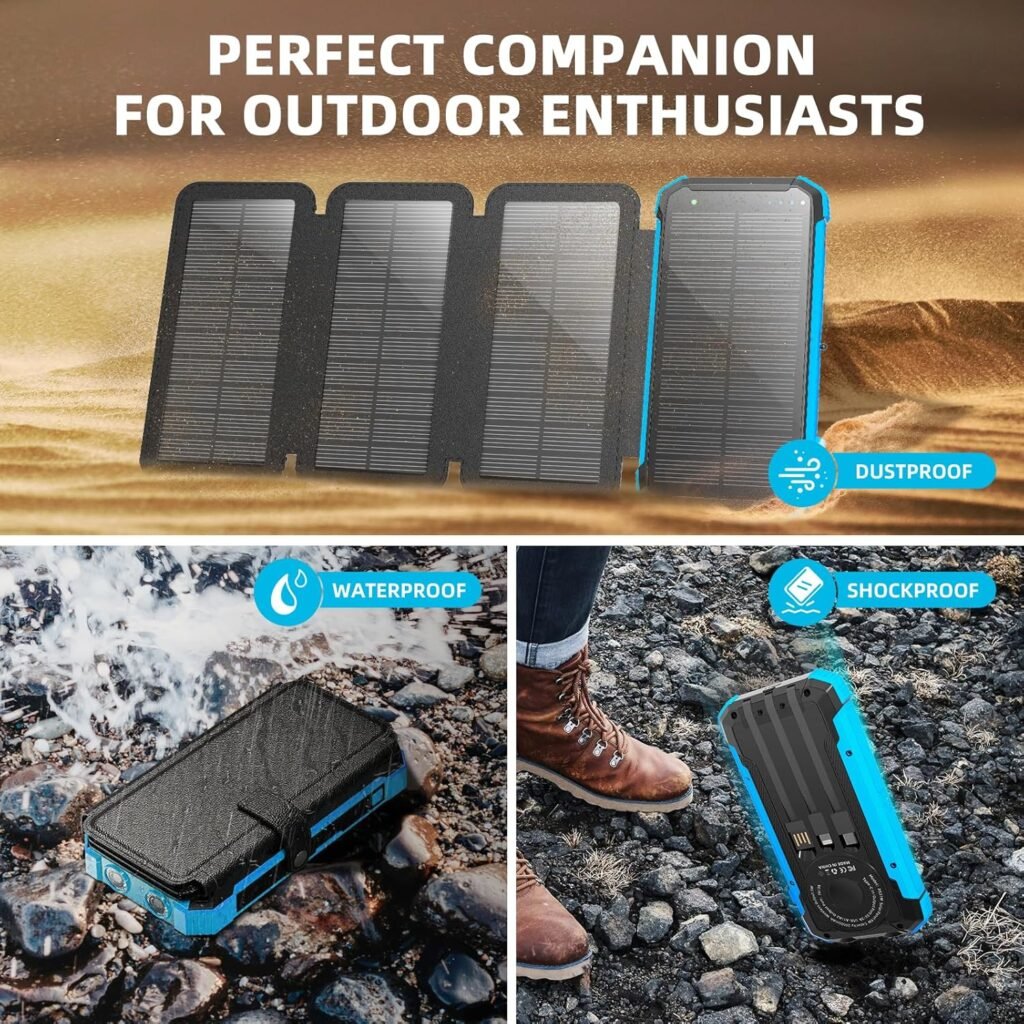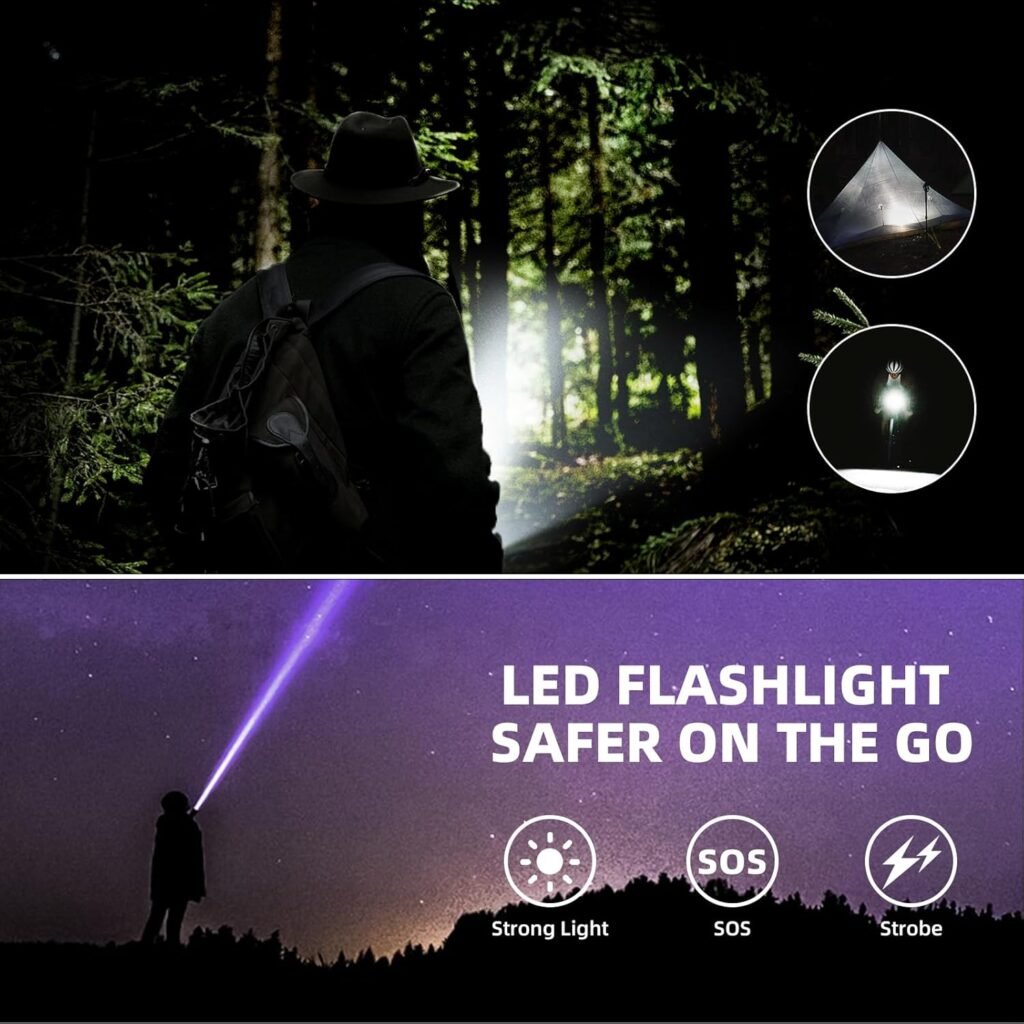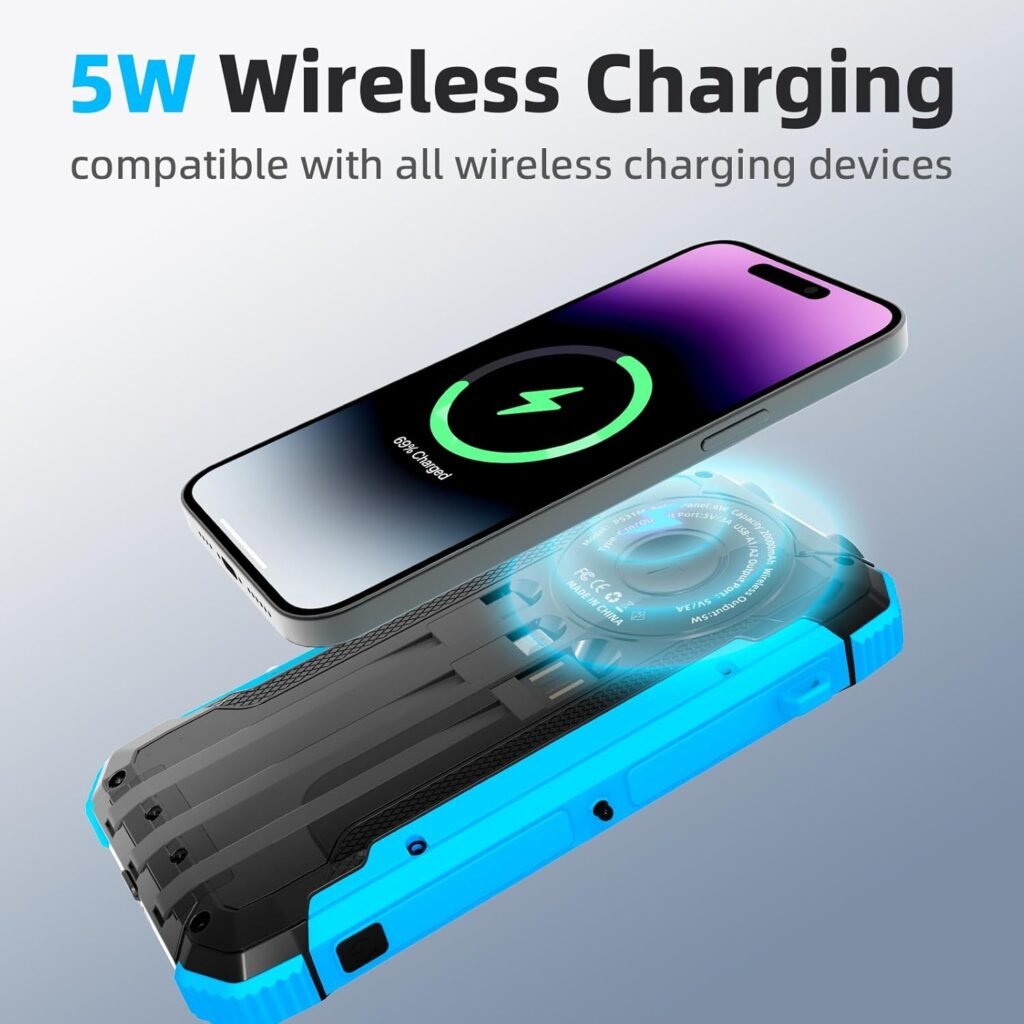Solar Charger Power Bank 20000mAh review
Solar Charger Power Bank 20000mAh review
Are you trying to find a rugged, high-capacity power bank that can keep your devices charged during long trips and unexpected power outages?
Product at a glance
You’ll find the Solar Charger Power Bank 20000mAh, Portable Wireless Charger, 15W Fast Charging External Battery Pack with Dual Flashlight and USB C Outputs. This power bank combines a large battery, wireless charging, multiple ports, and outdoor-ready features like waterproofing and a built-in flashlight so you can stay powered and prepared when you’re away from reliable outlets.
Key specifications
You should know the core specs before deciding if this unit fits your needs. Below are the main performance and hardware highlights so you can compare quickly with other options.
Battery capacity and charging
The unit packs a 20000mAh battery capacity, which gives you multiple full charges for most smartphones and several partial charges for tablets. That large reservoir is meant for extended outings, weekend trips, and as emergency backup for at-home power disruptions.
Ports and outputs
You can expect USB-A ports, USB-C ports, and a Qi wireless charging pad on top for cable-free charging. The USB-C typically functions as a fast input/output port, while USB-A ports service legacy devices and accessories.
Wireless and solar features
The built-in Qi wireless charging provides 15W fast wireless output for compatible phones, letting you place a phone directly on the pad for hassle-free top-up sessions. The solar panel is present for emergency trickle charging in sunlight, though you should treat it as a supplemental feature rather than a primary recharge method.
Quick-spec table
You can use this table to scan the most relevant specs at a glance and decide whether the power bank suits your requirements.
| Feature | Detail |
|---|---|
| Model | Solar Charger Power Bank 20000mAh (Portable Wireless Charger) |
| Battery Capacity | 20000mAh |
| Wireless Charging | Qi wireless, up to 15W |
| Fast Charging | 15W wireless; USB-C supports fast charge (varies by device) |
| Outputs | USB-A (multiple), USB-C (input/output), wireless pad |
| Number of devices | Supports up to 5 devices simultaneously |
| Outdoor Rating | Waterproof, shockproof, dustproof (IP rating not specified) |
| Flashlight | Dual high-brightness LED, steady/flash/SOS modes |
| Accessories | USB-C cable, carabiner, user manual |
| Protection | Intelligent IC for overcharge/overheat/short protection |
| Support | 24/7 customer service |
Design and build quality
You’ll notice the unit is built with outdoor use in mind, featuring a rugged exterior that resists common environmental hazards. The finish is practical rather than flashy, with textured sides for grip and reinforced corners to take small drops without immediate damage.
Ruggedness: waterproof, shockproof, dustproof
The manufacturer advertises waterproof, shockproof, and dustproof properties to keep the unit functioning even when conditions get rough. You should still avoid full submersion unless the specific IP rating is confirmed, but the design is solid for hiking, camping, and travel in adverse weather.
Size, weight and portability
At 20000mAh capacity, expect a slightly larger and heavier unit than compact 10k banks, but it remains portable enough to hang from a backpack with the included carabiner. You’ll trade a little extra weight for much more power storage, which is a fair exchange for multi-day trips.
Included accessories
You get a USB-C charging cable, a user manual, and a carabiner in the box, so you can clip the charger to a pack or hang it near a tent entrance. The package is basic but practical, and the cable is the most important accessory for fast recharge via USB-C.
Charging performance
You want reliable and reasonably fast charging, and this power bank aims to balance speed with smart protection. Performance depends on which port you use, what cables and adapters you have, and the demands of your device at the time of charging.
USB-C input/output performance
The USB-C port typically offers the best charging speed, both for recharging the power bank itself and for powering compatible devices. If your device supports Power Delivery (PD) and you use a PD-capable cable and adapter, you should see respectable charging times that shorten device top-up windows.
USB-A outputs performance
USB-A ports cover devices that don’t use USB-C, but they will usually charge slower compared to USB-C PD. They remain handy for accessories like cameras, Bluetooth speakers, older phones, and small gadgets that don’t require high wattage.
Wireless charging performance
The built-in Qi wireless pad supports up to 15W, which counts as fast wireless charging when conditions are ideal and the phone supports that speed. Wireless charging will typically be slower than a wired PD connection and can generate more heat, so keep the phone aligned on the pad and avoid simultaneous heavy use of other outputs if you want the fastest wireless performance.
Simultaneous charging
You can charge up to 5 devices at once, which is convenient for group outings or when you’re carrying multiple gadgets. Realize that total available power is shared among active outputs, so charging speeds will vary depending on how many devices are drawing current and how high their power demands are.
Solar charging: reality check
You’ll appreciate the inclusion of a solar panel for emergency or supplemental charging, but the solar input should be treated as slow and unreliable compared to plugged-in recharging. The solar feature is best for topping off the battery gradually if you’re off-grid or need a slow trickle when no outlet is available.
Solar panel efficiency and charging time
Solar panels on portable power banks are typically small and provide limited current, so full recharge of a 20000mAh battery via solar will take many hours, often across multiple days of direct sunlight. Use solar as backup power or for emergency top-ups rather than the main method for replenishing a drained battery bank.
Practical recommendations for solar use
When you rely on solar, position the panel for maximum direct sun, keep it clean, and use the included carabiner to hang the unit where it faces the sun unobstructed. You should also pre-charge the bank before leaving for trips and only expect solar to provide partial recovery unless you’re willing to wait a long time.
Battery life and longevity
You’ll want the battery to perform reliably over many cycles, and the smart protection IC aims to preserve health and maximize lifespan. With typical lithium battery chemistry, proper care and sensible charging habits will keep your power bank usable for many months to a few years before noticeable capacity loss occurs.
Real-world runtime examples
In practical terms, a 20000mAh bank often gives 3–6 full charges for typical smartphones depending on the phone model and power usage during charging. For smaller devices or lower-capacity phones, you can expect more cycles; for power-hungry phones or while charging tablets, you’ll see fewer full recharges.
Battery health and cycle expectations
You should expect gradual capacity decline after dozens to a few hundred full charge cycles, just like any lithium pack. Keeping the unit at moderate temperatures, avoiding constant complete discharges, and using proper charging adapters can extend the useful life of the battery.
Safety and smart features
You’ll get several protections built into the unit designed to protect both the power bank and your devices, which is especially important when you’re off-grid. The intelligent IC chip handles common faults and reduces risks associated with modern charging.
Intelligent protection IC chip and safety
The internal intelligent protection IC helps prevent overcharging, overcurrent, overvoltage, and overheating scenarios, making charging safer for your devices and the battery itself. This kind of smart regulation is essential when you’re using multiple ports simultaneously or fast-charging high-end phones.
Temperature, overcharge, and short-circuit protection
The unit is built to cut off or throttle power if it detects unsafe conditions, which protects you from short circuits and reduces the risk of thermal issues. You still should avoid exposing the device to extreme temperatures for prolonged periods to minimize stress on the electronics and battery.
Outdoor features and flashlight
You’ll get a high-brightness dual LED flashlight with multiple modes that doubles as a safety tool when you’re outdoors. These modes make the unit useful for lighting campsites, signaling in emergencies, and providing general illumination when you need it.
Flashlight performance and modes
The flashlight supports steady, flashing, and SOS modes so you can use it for illumination or as a distress signal if needed. The LEDs are bright enough for close-range tasks like setting up a tent, reading a map, or signaling for help, but they’re not a replacement for dedicated lighting systems for long-range visibility.
Mounting options and carabiner
The included carabiner lets you hang the power bank from a backpack, tent loop, or branch to keep it secure while charging in sunlight or to position the flashlight. This small convenience keeps the unit accessible and prevents it from getting buried in your pack or gear.
User experience and usability
You’ll find the device straightforward to use: plug in, set a phone on the wireless pad, or switch flashlight modes according to your needs. Clear LED indicators and simple button controls make it easy to understand charging status and battery level at a glance.
Buttons, indicators, and ease of use
Most people will appreciate the status LEDs for battery level and charging state, and the power button typically manages both wireless output and the flashlight. Familiarize yourself with the button presses for switching flashlight modes and starting/stopping wireless charging to avoid accidental activation or drain.
Charging cables and compatibility
USB-C is now the most versatile and often fastest charging interface, so using high-quality USB-C cables and PD-compatible wall adapters will give you the best results. Your older devices will still work via USB-A, but note that charging speeds will vary based on device capability and cable quality.
Pros and cons
You’ll want a clear list of what this power bank does well and where compromises exist so you can weigh its value. Below are the main strengths and limitations to help you make a balanced decision.
| Pros | Cons |
|---|---|
| Large 20000mAh capacity supports multiple charges | Solar panel is supplemental—slow for full recharge |
| Qi wireless charging up to 15W for convenience | Heavier and larger than compact power banks |
| Multiple ports and simultaneous charging for up to 5 devices | Charging speed shared across ports when many devices connected |
| Rugged design with waterproof, shockproof, and dustproof claims | IP rating unspecified—avoid total submersion without confirmation |
| Dual flashlight with SOS mode useful for emergencies | Flashlight drains battery if left on |
| Intelligent protection IC and 24/7 support included | Solar efficiency depends heavily on environment and sunlight |
Who should buy this
You should consider this unit if you regularly spend time outdoors, travel with multiple devices, or want a high-capacity backup for emergencies. It’s well-suited for campers, weekend travelers, small groups, and anyone who needs to charge multiple devices without access to mains power.
Who should consider alternatives
You might want a different option if you need extremely fast wired charging for laptops or demand very fast recharge times for the power bank itself. People who plan to rely primarily on solar recovery or require an IP68 submersion rating should consider specialized solar panels or power packs with certified high IP ratings.
Comparison with similar products
You’ll find many competitors in the 20k category, and comparing features will help you pick the right model for your priorities. Consider battery chemistry, true output wattage, number of simultaneous ports, and build quality when pitting this product against alternatives.
Vs typical 10000mAh banks
A 10000mAh bank is lighter and easier to carry but offers roughly half the total energy, meaning more frequent recharges. You’ll choose the 20000mAh version here when you need multi-day power or to service multiple devices without recharging the bank often.
Vs dedicated solar chargers
Dedicated solar chargers usually have larger panels and faster solar input, but they often lack a large internal battery or compact portability. If you need reliable solar recharging during long off-grid use, pair a larger solar panel with a battery pack; if you need an all-in-one portable solution, this unit can handle occasional solar top-ups.
Tips for getting the most from your solar power bank
You’ll get better, longer-lasting performance if you follow a few simple habits that protect battery life and optimize charging efficiency. The suggestions below keep your power bank ready for use and extend overall utility.
Charging routine and cable tips
Use a quality USB-C PD adapter and cable to recharge the power bank as quickly and safely as possible. Avoid leaving devices plugged in for extended periods after they reach 100% to minimize unnecessary battery cycling and heat buildup.
Storing and maintaining battery health
Store the power bank partially charged (around 40–60%) if you won’t use it for a long time, and keep it in a cool, dry place. Avoid extreme cold or heat, and cycle the battery occasionally to keep it healthy if stored for long durations.
Troubleshooting common issues
You’ll probably find any small issues manageable with a few checks and basic steps, and the built-in protections reduce the risk of irreparable faults. Below are common problems and straightforward solutions to get you back up and running.
Reduced capacity or not holding charge
If you notice reduced capacity, check how many cycles the bank has gone through and how it’s been stored; battery capacity naturally declines over time. Try fully charging and then discharging the bank once to recalibrate the indicators, and contact support if capacity loss is dramatic or sudden.
Wireless charging not working
If wireless charging doesn’t start, ensure the phone is centered on the pad and remove thick cases or metal accessories that interfere with Qi alignment. Verify the power bank is turned on and has sufficient charge; some banks require the wireless mode to be activated via a button or a short press.
Warranty, support and what’s in the box
You’ll receive the power bank, a USB-C cable, a carabiner, and a user manual in the package, giving you the essentials to get started immediately. The manufacturer advertises 24/7 customer support to handle troubleshooting, returns, or warranty inquiries so you can get help whenever you need it.
After-sales support and customer service
You should reach out to customer service for defects, abnormal battery performance, or missing accessories; having 24/7 support is reassuring for items used in critical or remote situations. Keep your purchase receipt and serial or model number handy when contacting support to expedite responses and solutions.
Final verdict
You’ll find the Solar Charger Power Bank 20000mAh a compelling choice if you need a dependable, high-capacity unit with wireless charging and rugged outdoor features. It’s particularly useful for group travel, camping, and emergency preparedness, where the ability to charge multiple devices and use a built-in flashlight can make a real difference.
You should remember that the solar functionality is best viewed as an emergency or auxiliary tool rather than a primary recharge method, and overall performance will depend on good charging accessories and sensible usage. If you want a balanced combination of capacity, wireless convenience, and outdoor durability without paying a premium for specialized solar equipment, this power bank is a solid option to consider.
Disclosure: As an Amazon Associate, I earn from qualifying purchases.
